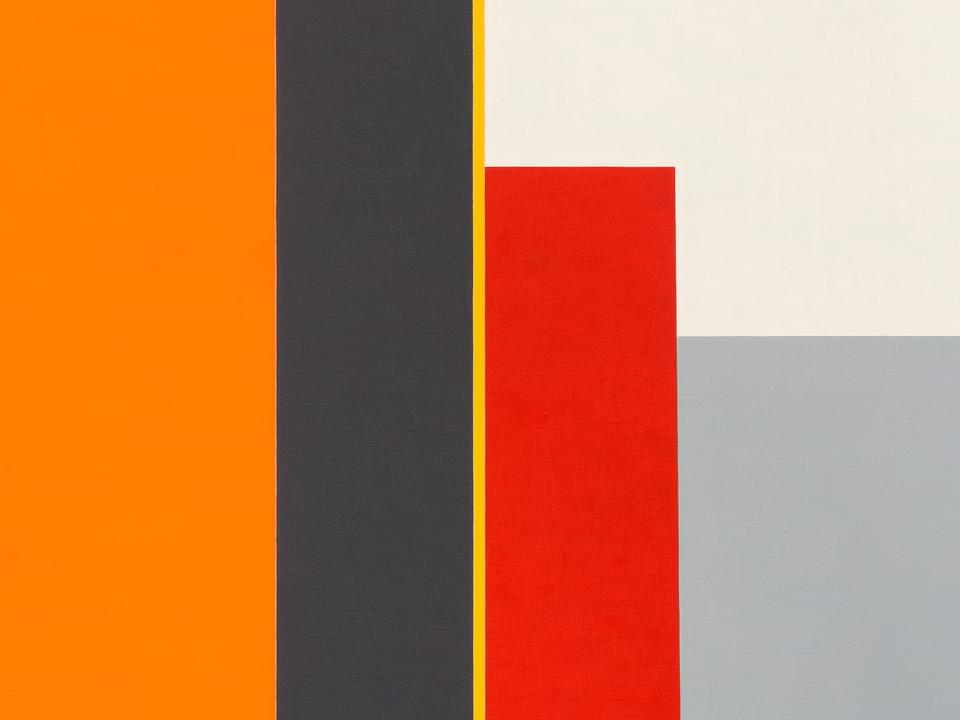
Léon Wuidar (2019)
Léon Wuidar
9 November 2018 – 12 January 2019
Dates
9 November 2018 – 12 January 2019
The artist’s second show with the gallery, including early and mid-career works from the 1960s to the mid-1980s, highlights his committed engagement with the language of Brutalist architecture and Art Concret.
Born in 1938 in Liège, Wuidar has explored geometric abstraction for over 60 years, refining his own particular approach which is informed by and deeply connected to architecture and its concerns of light, space, volume and perspective. Wuidar has often cited his childhood memory of destroyed buildings in post-war Belgium as a key influence on his practice, as well as his continuing friendship and collaboration with Belgian architect Charles Vandenhove, who designed the Brutalist house and studio in Esneux where Wuidar lives and works. ‘A house is an assembly of geometric shapes, so Charles and I have a common vocabulary’ he has said.
Wuidar’s paintings are characterised by their formal precision, which is predicated on a series of dualities set up within the picture plane. Symmetry is set against asymmetry, for example, hard-edged forms set against organic or soft-edged shapes and bold colour offset by neutral tones. Compositions are built up using a range of fundamental forms: squares, rectangles, polygons or curves, which are repeated, inverted and contrasted with blocks of colour. Wuidar frequently delineates areas of the compositions – or the entire picture itself – with lines or bands of colour, allowing such forms to command their own space as well as playing an integral part in the overall image construction.
In several works, recognisable architectural details are suggested, such as windows or pillars (Le Maître du Jeu, 1970), church spires (Pointe, 4 Décembre 1974, 1974), or the overlapping diagonals of city roofs (Les images quotidiennes, 24 Sept.69, 1969), all inferred through relationships of form and tone. Other paintings point to schematic landscapes – as if images recalled from memory – emphasised by their titles which often include a specific date, such as Monument de sable blanc, 21 Avril 67 (1967). Through a process of overlaying and interlocking, these compositions evoke multiple depths and perspectives, as if the viewer is looking through to a distant point or upwards and downwards through overlapping architectural structures. In this way, Wuidar undertakes an intense exploration of dimensionality, creating a compression of space in his paintings that can often appear vertiginous, like an expanded or enlarged detail barely contained within the limits of the picture plane. ‘There’s not a lot to see in my paintings; there is no subject or anecdote...’ he has said. ‘There’s always a frame, which does put a limit on things. My paintings are like an interior – it’s intimate. Small paintings of the 17th Century with modest themes, or even the work of Italian painter and printmaker Giorgio Morandi radiate this same sense of intimacy.’
Léon Wuidar was born in 1938 in Liège and lives and works in Esneux, Belgium. Recent solo exhibitions include White Cube, London (2018); Galerie Rodolphe Janssen, Brussels (2016 and 2017); Bibliotheca Wittockiana, Brussels (2010); L’Espace du Dedans, Lille (2009); and Gesellschaft für Kunst und Gestaltung, Bonn (2007). His work has also been included in numerous group exhibitions including ‘L'abstraction géométrique belge’, Mouans-Sartoux, France (2015); BAM, Mons, Belgium (2014); ‘Un siècle d’art abstrait’, Musée René Magritte, Brussels (2010); ‘François Jacqmin’, Musée d’Art Moderne et d’Art Contemporain, Liège (2005); ‘Meditazione, Uno sguardo su alcuni artisti belgi’, Ville Ponti, Ricerca, Italy (2001); and ‘Pure Abstract Art’, Mondriaanhuis, Amersfoort, The Netherlands (1999).
Wuidar’s work is held in international public collections including Musée des Beaux-Arts, Brussels; Bibliothèque Albertine, Brussels; Fernmeldetechnisches Zentralamt, Darmstadt, Germany; Dorstener Maschinenfabrik, Dorsten, Germany; Fondation IDAC, Mondriaanhuis, Amersfoort, The Netherlands; Musée d’Art Wallon, Liège; Cabinet des Estampes, Liège; Musée en plein air du Sart Tilman, Liège; Centre de la Gravure et de l’image imprimée, La Louvière, Belgium; Fondation Meeus, Louvain-la-Neuve, Belgium; Musée de Mariemont, Morlanwelz, Belgium; and Musée des Beaux-Arts, Verviers, Belgium.
Create an Account
To view available artworks and access prices.














